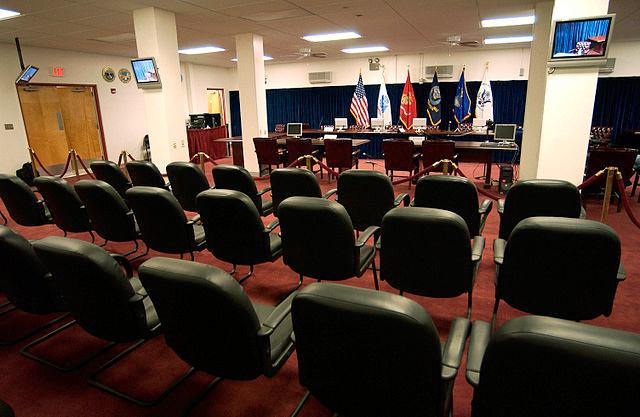Guantanamo pre-trial hearings begin for alleged masterminds of 9/11 attacks
Commissions building courtroom at Guantanamo Bay, Cuba.(Photo by Christopher Mobley via Wikimedia Commons).
Pre-trial hearings began Monday in the case against five men accused of terrorism for planning attacks on the United States on Sept 11, 2001.
Carol Rosenberg, a reporter for the Miami Herald, explained that the hearings will be complicated by questions about how the defendants were detained.
Rosenberg said that one of the issues that will be argued is the status of CIA black sites, the secret prisons where the five accused men were held after their arrests in 2002 and 2003.
“The defense want a protective order put on [the black sites] just like at Abu Ghraib,” she said. Each of the accused men were interrogated and detained for three to four years before being sent to the Guantánamo Bay detention camp.
Veteran Army Col. and retired judge James Pohl has been brought back from retirement to run the war tribunal. When information came out in 2004 about the prisoner abuse scandals at Abu Ghraib prison in Iraq, then-President George W. Bush said the Abu Ghraib prison should be demolished. Pohl stood up in opposition by putting a protective order on the prison, ending its demolition by declaring it a crime scene.
Though many want the hearings to focus on what happened on Sept. 11, Rosenberg said, these hearings are used to set the conditions for their eventual trial.
“There are two views of this case,” she said. “What we the people can know and hear about what the U.S. did with these men, and what the military officers who will eventually be jurors on this trial will hear.”
These trials are not about what happened on Sept. 11th, Rosenberg said. They are about what happened to these men while they were in the CIA black sites.
The trials are being held in a courtroom on the Guantánamo Bay Navy Base in Cuba. During the hearings spectators sit in a soundproof booth where they hear the proceedings with a 40-second delay.
“If somebody says something that we shouldn’t hear [the intelligence officer] hits a button and we get white noise,” she said. “If you’re sitting in the spectator’s booth it actually can be really perplexing. The judge can come in, sit down at his bench and then we can hear ‘all rise.’ By then, everyone in court has stood and sat down.”
The judge has restricted the proceedings to legal arguments during the pre-trial, Rosenberg said, but the men on trial often stray from that type of request.
Khalid Sheik Mohammed, accused of being the mastermind behind the Sept. 11, 2001 attacks, said during a hearing last October, “Your blood is not gold and ours is not water.”
“But after that speech, the judge told him that’s the last time we’re going to hear from him, that he’s supposed to speak through his lawyer,” Rosenberg said.
The pre-trial phase is complicated and will take time to complete. This can be hard on the families of victims, Rosenberg said.
“They think America and the world has moved on, but nearly 3,000 people died that day. For them, time almost stood still on Sept. 11th,” she said. “They want to see this trial get started and these pre-trial hearings suggest the trial is certainly more than a year away.”
